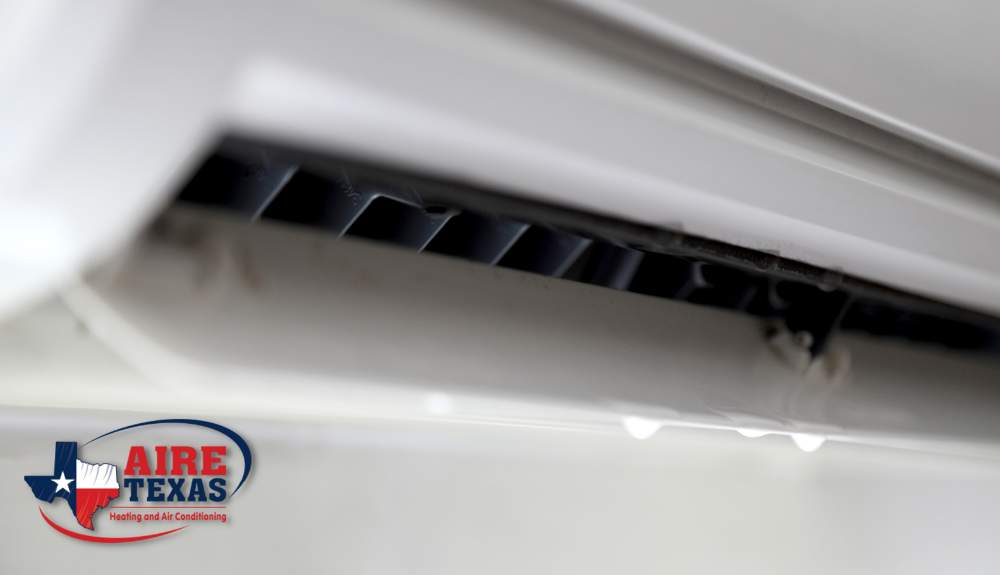As the Texas temperatures rise, Plano homeowners will reach for their thermostats more to keep their homes cool. However, one common issue many may encounter is an air conditioner leaking water, affecting the unit’s ability to cool the house effectively.
Recognizing the early signs of an AC leak is crucial for maintaining a healthy, efficient home environment. Keep an eye out for signs like water pooling around your unit, unusual noises during operation, or a noticeable drop in cooling performance, as these are key indicators that something may be wrong. It’s important to address these water leaks quickly to prevent potential damage to your home and to ensure that your air conditioning system continues to operate at peak efficiency.
If you’re struggling with a leaking air conditioner unit, contact Aire Texas Heating and Air Conditioning at (972) 424-2473 to schedule an appointment with one of our Plano HVAC experts today.
Is It Normal for AC to Leak Water?
It’s not uncommon for homeowners to notice some water around their AC unit, especially on hot, humid days. However, distinguishing between normal condensation and an actual leak is important.
Typically, AC units produce condensation as they cool and dehumidify the air. This water should be channeled away from the air conditioning unit through its drainage system. If you notice more than the usual condensation or if the water is accumulating and not draining correctly, this could indicate a problem, such as a clogged drain line or a malfunctioning pump.
Why is My AC Leaking Water?
There are several reasons your air conditioning unit could leak water. Common causes include a clogged condensate drain line, improper installation, or issues with the condensate pump.
Another issue that can lead to air conditioner leaks is low refrigerant levels, which can cause the coils to freeze and thaw, leading to excess water that the drainage system may not handle efficiently. Environmental factors, such as debris blocking the drainage or extreme humidity levels, can also play a role in these leaks.
Clogged Drain Line
A clogged drain line is one of the most frequent culprits behind water leakage in air conditioning systems. Over time, dirt, debris, and even mold can accumulate in the condensate drain pipe, preventing water from draining out of the system properly. This clogged AC drain line causes water to back up and overflow, leading to noticeable leaks around your AC unit.
Dirty Air Filter
Dirty air filters in your air conditioning system can lead to various issues, including water leakage. When the air filter becomes clogged with dust, pet hair, and other debris, it restricts airflow to the evaporator coils. This reduced airflow can cause the coils to freeze over. Once the ice on the coils melts, it results in an excessive buildup of water that the drainage system may not be able to handle, causing water to leak out of the unit.
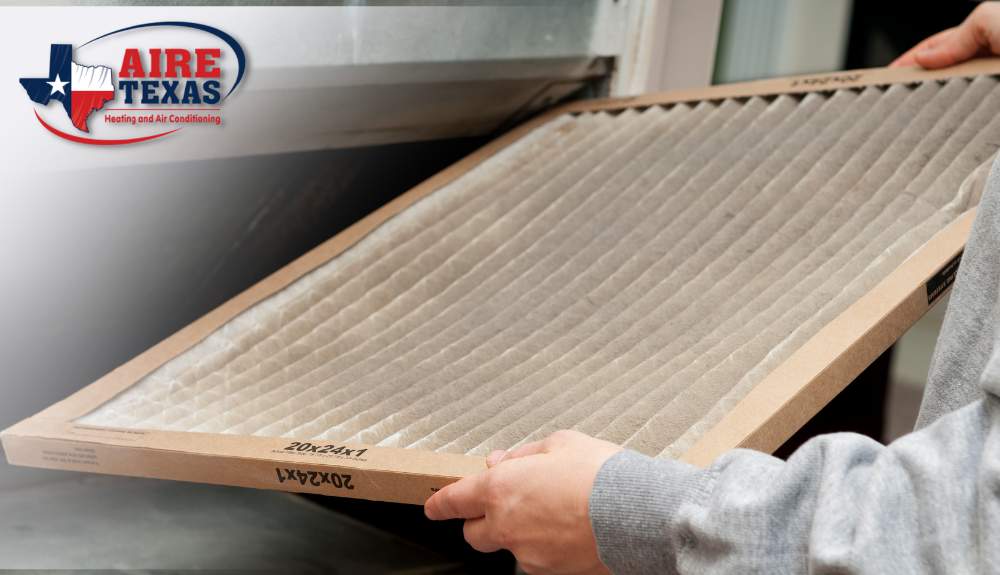
AC Refrigerant Leak
A refrigerant leak not only causes your AC to underperform, leading to warm air output, but it can also result in water leaks as the reduced pressure allows the evaporator coils to freeze and thaw, producing excess water. Identifying and repairing a refrigerant leak promptly is crucial to ensure your AC system functions efficiently and to prevent further complications such as increased energy usage and potential damage to the unit. Professional Plano air conditioning technicians, like those here at Aire Texas, are best suited to handle these repairs, as they can safely manage refrigerant and restore your system’s performance.
Damaged Drain Pan
A damaged or rusted drain pan is another common reason for water leaks in air conditioning systems. The drain pan collects condensation from the AC unit as it operates, directing it away through the drain line. Over time, however, wear and tear can cause the pan to crack, corrode, or rust, leading to water escaping and pooling around the air conditioner unit.
Frozen Evaporator Coil
A frozen evaporator coil occurs when there is insufficient airflow across the coils, often due to a dirty air filter or blocked air ducts.Low refrigerant levels can also cause the coils to freeze. When the ice on the evaporator coil melts, it produces more water than the drain pan can handle, resulting in overflow and leaks.
Faulty Condensate Pump
A faulty condensate pump can be yet another reason behind an air conditioner leaking water, especially in setups where the indoor unit is located in a basement or below the level of the home’s drainage system.
The pump’s job is to move the collected condensation from the AC unit to the outside or into a drainage line. If this pump fails or malfunctions, water will not be properly expelled, leading to accumulation and potential overflow around the unit.
Poor Installation of Unit
Poor installation of an air conditioner can lead to several operational problems, including water leaks. If the unit is not level, or if there has been improper installation of the drainage system, it can prevent water from draining effectively, causing it to back up and leak out. Additionally, incorrect sizing or placement of components can strain the system, potentially leading to other issues that result in leaks.
With this in mind, it’s imperative for home and business owners to seek the assistance of professional Plano AC installation technicians to ensure their AC is installed properly and doesn’t cause problems, such as AC leaks, later on down the line.
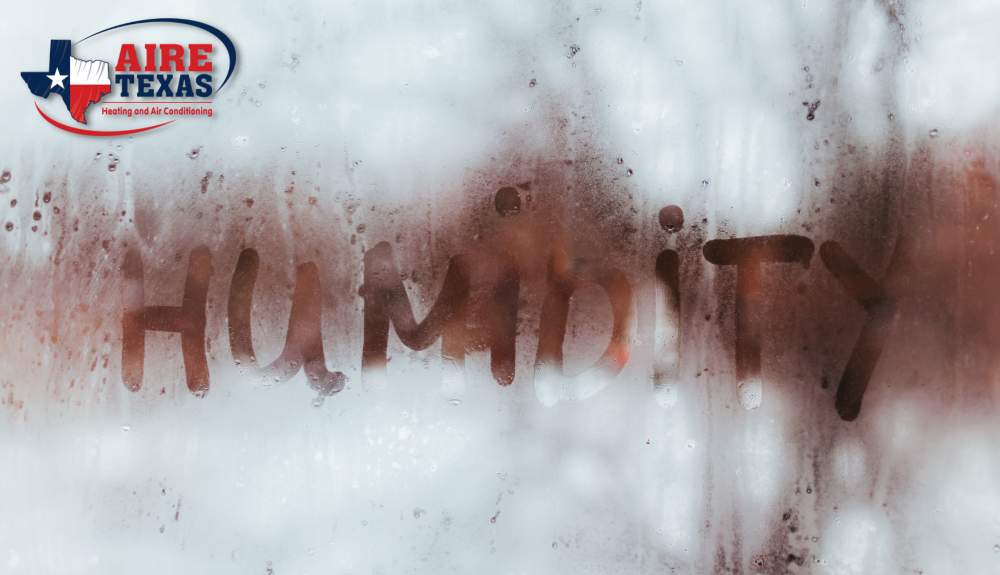
High Humidity Levels
High humidity levels can significantly impact the performance of your air conditioning system and lead to excess water production. When the air is very humid, your air conditioner has to work harder to condense and remove moisture from the air, which can result in an increased volume of water that the system must process. To manage high humidity, it’s important to ensure that your AC system is properly sized for your environment and that all components, especially the drainage system, function optimally.
Is Water Coming From AC Dangerous?
Water leaking from your air conditioning unit can raise concerns about safety and potential damage. While the water itself is typically not hazardous, the consequences of an unchecked AC leak can be serious.
Standing water can lead to mold and mildew growth, which compromises indoor air quality and can trigger allergies or respiratory issues. Additionally, water leaks can cause structural damage to your home, including weakened walls, ceilings, and floors. There is also the risk of electrical hazards if water comes into contact with the system’s electrical components or other home wiring.
Why You Should Never Ignore AC Water Leaks
Ignoring water leaks from your air conditioning system can lead to serious problems, warranting immediate attention to prevent costly and hazardous outcomes. Left unchecked, these leaks can create ideal conditions for mold and mildew to thrive, damaging building materials and significantly degrading indoor air quality, posing safety and health risks to occupants as a result.
Structural damage is another major concern, as persistent moisture can weaken support structures, leading to costly repairs. Not only that, but water leaks also often indicate underlying inefficiencies in your AC, which can result in increased energy consumption and higher utility bills. To prevent or mitigate these issues, it’s important to call an HVAC professional as soon as possible after noticing your air conditioner leaking water.
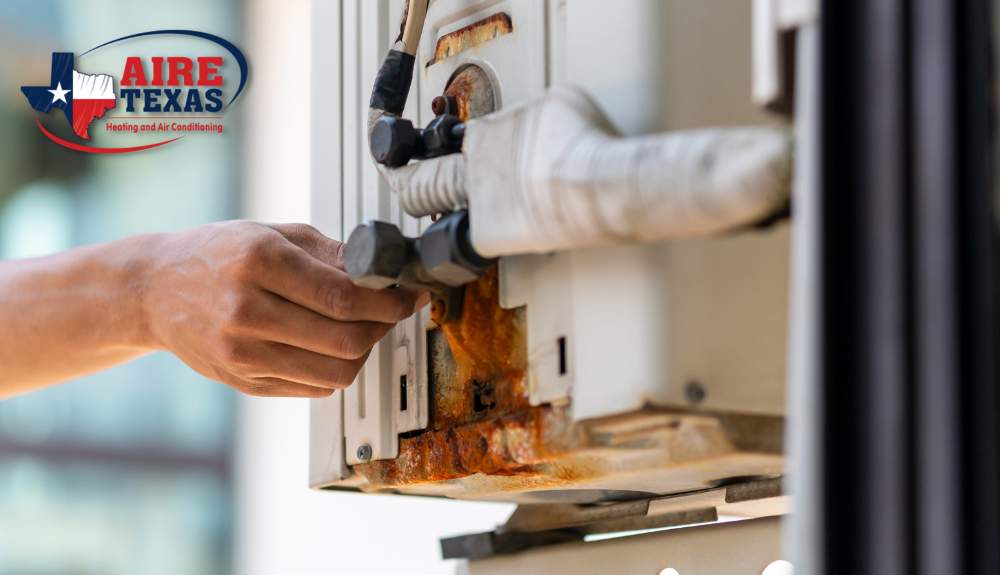
How To Fix Air Conditioner Leaking Water
If you notice your air conditioner leaking water, there are several steps you can take to troubleshoot and potentially resolve the issue on your own. First, check the drain line for clogs, a common cause of water leaks. Clear any blockages with a vacuum or a plumber’s snake to ensure proper drainage.
Next, examine and replace your air filters if they are dirty. A clean air filter promotes better airflow and can prevent frozen evaporator coils from defrosting, which leads to excessive water accumulation. Additionally, inspect the drain pan for any cracks or damage and replace it if necessary.
If these steps do not resolve the AC leak, or if you are unsure how to proceed, contact the Plano air conditioner experts from Aire Texas. Our certified HVAC technicians can inspect and address more complex issues, like refrigerant leaks or a broken condensate pump.
The Importance of Professional HVAC Services
Hiring a professional HVAC technician to diagnose and repair AC water leaks is crucial for several reasons. For starters, professionals bring a wealth of experience, specialized tools, and resources for accurately identifying and resolving complex issues that may not be noticeable to the untrained eye. They can efficiently troubleshoot problems, from refrigerant leaks to faulty wiring, that could be causing the water leaks.
Professional technicians are also equipped with the necessary tools to perform repairs safely and effectively, ensuring the system is restored to optimal function without risking further damage. Their in-depth understanding of HVAC systems also allows them to provide preventative maintenance advice, which can help avoid future issues.
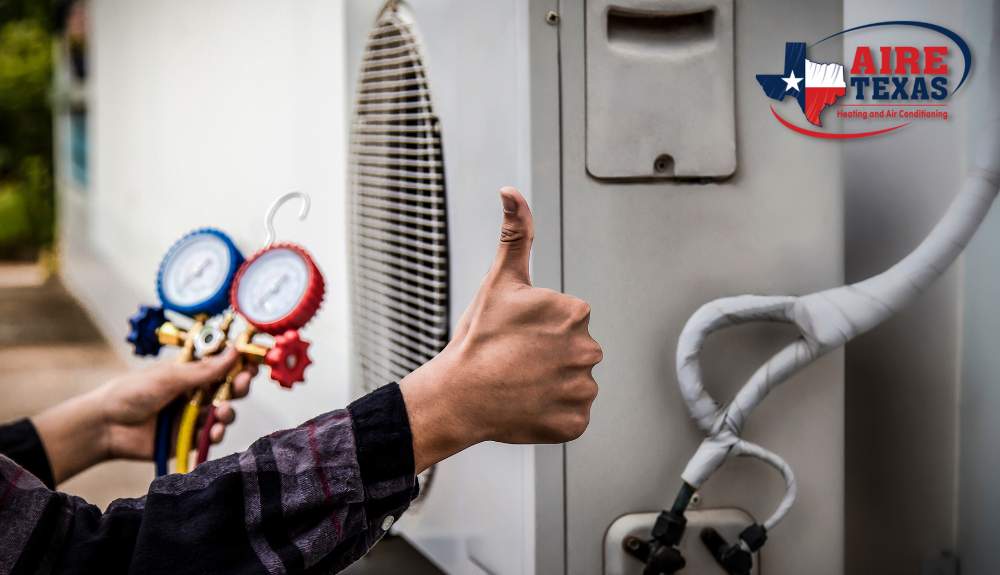
AC Leaking Water? Our Plano Air Conditioning Pros at Aire Texas Are Here to Help
If you’re dealing with an AC leaking water, our Plano AC repair professionals at Aire Texas are here to assist you. We understand the urgency and inconvenience of HVAC issues and are committed to providing fast, effective solutions to ensure your system runs smoothly.Don’t let a leaking AC disrupt your day; contact Aire Texas at (972) 424-2473 or contact us online to schedule an air conditioner consultation today.

